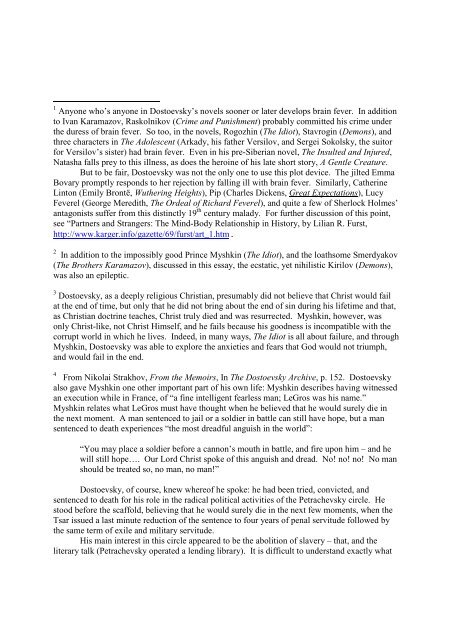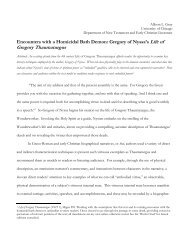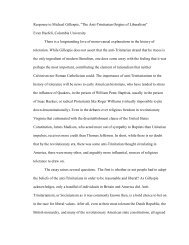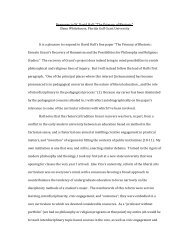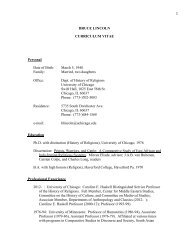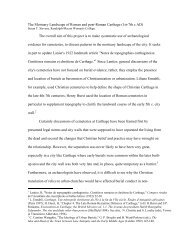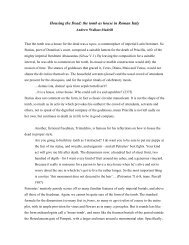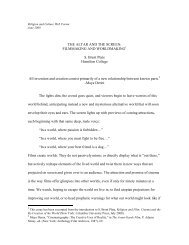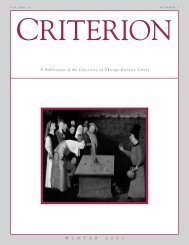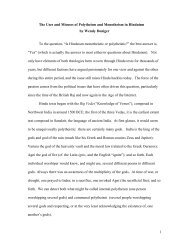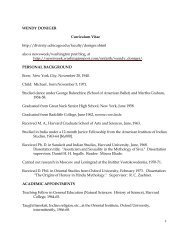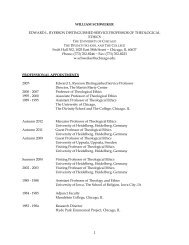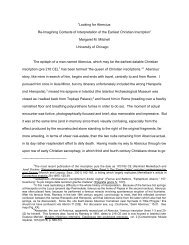The Reification of Evil and The Failure of Theodicy: The Devil in ...
The Reification of Evil and The Failure of Theodicy: The Devil in ...
The Reification of Evil and The Failure of Theodicy: The Devil in ...
You also want an ePaper? Increase the reach of your titles
YUMPU automatically turns print PDFs into web optimized ePapers that Google loves.
1 Anyone who’s anyone <strong>in</strong> Dostoevsky’s novels sooner or later develops bra<strong>in</strong> fever. In addition<br />
to Ivan Karamazov, Raskolnikov (Crime <strong>and</strong> Punishment) probably committed his crime under<br />
the duress <strong>of</strong> bra<strong>in</strong> fever. So too, <strong>in</strong> the novels, Rogozh<strong>in</strong> (<strong>The</strong> Idiot), Stavrog<strong>in</strong> (Demons), <strong>and</strong><br />
three characters <strong>in</strong> <strong>The</strong> Adolescent (Arkady, his father Versilov, <strong>and</strong> Sergei Sokolsky, the suitor<br />
for Versilov’s sister) had bra<strong>in</strong> fever. Even <strong>in</strong> his pre-Siberian novel, <strong>The</strong> Insulted <strong>and</strong> Injured,<br />
Natasha falls prey to this illness, as does the hero<strong>in</strong>e <strong>of</strong> his late short story, A Gentle Creature.<br />
But to be fair, Dostoevsky was not the only one to use this plot device. <strong>The</strong> jilted Emma<br />
Bovary promptly responds to her rejection by fall<strong>in</strong>g ill with bra<strong>in</strong> fever. Similarly, Cather<strong>in</strong>e<br />
L<strong>in</strong>ton (Emily Brontë, Wuther<strong>in</strong>g Heights), Pip (Charles Dickens, Great Expectations), Lucy<br />
Feverel (George Meredith, <strong>The</strong> Ordeal <strong>of</strong> Richard Feverel), <strong>and</strong> quite a few <strong>of</strong> Sherlock Holmes’<br />
antagonists suffer from this dist<strong>in</strong>ctly 19 th century malady. For further discussion <strong>of</strong> this po<strong>in</strong>t,<br />
see “Partners <strong>and</strong> Strangers: <strong>The</strong> M<strong>in</strong>d-Body Relationship <strong>in</strong> History, by Lilian R. Furst,<br />
http://www.karger.<strong>in</strong>fo/gazette/69/furst/art_1.htm.<br />
2 In addition to the impossibly good Pr<strong>in</strong>ce Myshk<strong>in</strong> (<strong>The</strong> Idiot), <strong>and</strong> the loathsome Smerdyakov<br />
(<strong>The</strong> Brothers Karamazov), discussed <strong>in</strong> this essay, the ecstatic, yet nihilistic Kirilov (Demons),<br />
was also an epileptic.<br />
3 Dostoevsky, as a deeply religious Christian, presumably did not believe that Christ would fail<br />
at the end <strong>of</strong> time, but only that he did not br<strong>in</strong>g about the end <strong>of</strong> s<strong>in</strong> dur<strong>in</strong>g his lifetime <strong>and</strong> that,<br />
as Christian doctr<strong>in</strong>e teaches, Christ truly died <strong>and</strong> was resurrected. Myshk<strong>in</strong>, however, was<br />
only Christ-like, not Christ Himself, <strong>and</strong> he fails because his goodness is <strong>in</strong>compatible with the<br />
corrupt world <strong>in</strong> which he lives. Indeed, <strong>in</strong> many ways, <strong>The</strong> Idiot is all about failure, <strong>and</strong> through<br />
Myshk<strong>in</strong>, Dostoevsky was able to explore the anxieties <strong>and</strong> fears that God would not triumph,<br />
<strong>and</strong> would fail <strong>in</strong> the end.<br />
4 From Nikolai Strakhov, From the Memoirs, In <strong>The</strong> Dostoevsky Archive, p. 152. Dostoevsky<br />
also gave Myshk<strong>in</strong> one other important part <strong>of</strong> his own life: Myshk<strong>in</strong> describes hav<strong>in</strong>g witnessed<br />
an execution while <strong>in</strong> France, <strong>of</strong> “a f<strong>in</strong>e <strong>in</strong>telligent fearless man; LeGros was his name.”<br />
Myshk<strong>in</strong> relates what LeGros must have thought when he believed that he would surely die <strong>in</strong><br />
the next moment. A man sentenced to jail or a soldier <strong>in</strong> battle can still have hope, but a man<br />
sentenced to death experiences “the most dreadful anguish <strong>in</strong> the world”:<br />
“You may place a soldier before a cannon’s mouth <strong>in</strong> battle, <strong>and</strong> fire upon him – <strong>and</strong> he<br />
will still hope…. Our Lord Christ spoke <strong>of</strong> this anguish <strong>and</strong> dread. No! no! no! No man<br />
should be treated so, no man, no man!”<br />
Dostoevsky, <strong>of</strong> course, knew where<strong>of</strong> he spoke: he had been tried, convicted, <strong>and</strong><br />
sentenced to death for his role <strong>in</strong> the radical political activities <strong>of</strong> the Petrachevsky circle. He<br />
stood before the scaffold, believ<strong>in</strong>g that he would surely die <strong>in</strong> the next few moments, when the<br />
Tsar issued a last m<strong>in</strong>ute reduction <strong>of</strong> the sentence to four years <strong>of</strong> penal servitude followed by<br />
the same term <strong>of</strong> exile <strong>and</strong> military servitude.<br />
His ma<strong>in</strong> <strong>in</strong>terest <strong>in</strong> this circle appeared to be the abolition <strong>of</strong> slavery – that, <strong>and</strong> the<br />
literary talk (Petrachevsky operated a lend<strong>in</strong>g library). It is difficult to underst<strong>and</strong> exactly what


